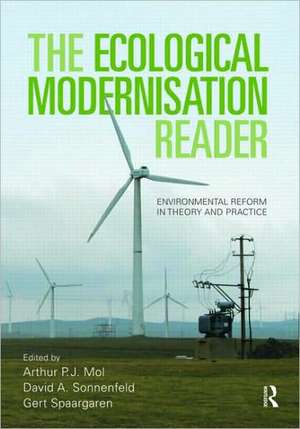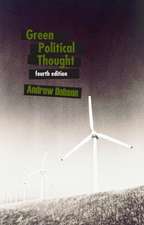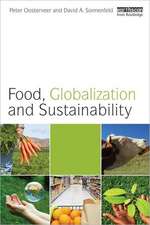The Ecological Modernisation Reader: Environmental Reform in Theory and Practice
Editat de Arthur P. J. Mol, David A Sonnenfeld, Gert Spaargarenen Limba Engleză Hardback – 17 iul 2009
| Toate formatele și edițiile | Preț | Express |
|---|---|---|
| Paperback (1) | 389.09 lei 3-5 săpt. | +40.93 lei 4-10 zile |
| Routledge – 19 iul 2009 | 389.09 lei 3-5 săpt. | +40.93 lei 4-10 zile |
| Hardback (1) | 1028.17 lei 6-8 săpt. | |
| Taylor & Francis – 17 iul 2009 | 1028.17 lei 6-8 săpt. |
Preț: 1028.17 lei
Preț vechi: 1374.44 lei
-25% Nou
Puncte Express: 1542
Preț estimativ în valută:
196.80€ • 213.84$ • 165.42£
196.80€ • 213.84$ • 165.42£
Carte tipărită la comandă
Livrare economică 21 aprilie-05 mai
Preluare comenzi: 021 569.72.76
Specificații
ISBN-13: 9780415453707
ISBN-10: 0415453704
Pagini: 560
Ilustrații: 12 b/w images, 11 tables and 12 line drawings
Dimensiuni: 174 x 246 x 33 mm
Greutate: 1.2 kg
Ediția:1
Editura: Taylor & Francis
Colecția Routledge
Locul publicării:Oxford, United Kingdom
ISBN-10: 0415453704
Pagini: 560
Ilustrații: 12 b/w images, 11 tables and 12 line drawings
Dimensiuni: 174 x 246 x 33 mm
Greutate: 1.2 kg
Ediția:1
Editura: Taylor & Francis
Colecția Routledge
Locul publicării:Oxford, United Kingdom
Public țintă
Postgraduate and UndergraduateCuprins
1. Ecological Modernisation: Three Decades of Policy, Practice and Theoretical Reflection Part 1: Foundations of Ecological Modernisation Theory 2. The Origins and Theoretical Foundations of Ecological Modernisation Theory 3. On Ecological and Political Modernisation 4. Ecological Modernisation: Beyond Scarcity and Bureaucracy 5. Sociology, Environment and Modernity. Ecological Modernisation as a Theory of Social Change 6. Ecological Modernisation as Cultural Politics 7. Ecological Modernisation, Ecological Modernities 8. Ecological Modernisation as Social Theory Part 2: Transformations in Environmental Governance and Participation 9. Transformations in Environmental Governance and Participation 10. New Approaches to Environmental Governance 11. Environment and Participation in a Context of Political Modernisation 12. Democratic Ethics and Ecological Modernisation: The Formulation of California's Automobile Emission Standards 13. Ecological Modernisation, Risk Society, and the Green State Part 3: Greening Life-Cycles and Life-Styles 14. Greening Lifecycles and Lifestyles: Sociotechnical Innovations in Consumption and Production as Core Concerns of Ecological Modernisation Theory 15. Environmental Policy and Industrial Innovation: Integrating Environment and Economy Through Ecological Modernisation 16. Ecological Modernization of Industrial Systems 17. Sustainable Consumption: A Theoretical and Environmental Policy Perspective 18. Upstreaming Environmental Action Part 4: Environmental Reform in Asian and Other Emerging Economies 19. Ecological Modernisation in Asian and other Emerging Economies 20. Contradictions of Ecological Modernisation: Pulp and Paper Manufacturing in Southeast Asia 21. Why Ecological Modernisation and Sustainable Development should not be Conflated 22. Integrating Environmental and Economic Policy making in China and Taiwan 23. Environmental Management for Industrial Zones in Vietnam 24. Environment and Modernity in Transitional China: Frontiers of Ecological Modernisation 25. Shifts within Ecological Modernisation in South Africa: Deliberation, Innovation and Institutional Opportunities Conclusion 26. Ecological Modernisation: Assessment, Critical Debates and Future Directions
Notă biografică
Arthur P.J. Mol is chair and professor in environmental policy in the Environmental Policy Group (ENP) of Wageningen University, the Netherlands. He edited a number of books, and is the author of Globalization and Environmental Reform (2001) and Environmental reform in the Information Age (2008).
David A. Sonnenfeld is Professor and Chair of Environmental Studies at the New York State College of Environmental Science and Forestry. He is co-editor of Challenging the Chip: Labor Rights and Environmental Justice in the Global Electronics Industry (2006); and Ecological Modernisation Around the World (2000).
Gert Spaargaren is part-time Professor on ‘Environmental Policy for Sustainable Lifestyles and Consumption’ at the Environmental Policy Group of Wageningen University, The Netherlands. His publications are in the field of (environmental) sociology, sustainable consumption and behavior, and the globalization of environmental reform. He (co)edited Governing Environmental Flows (2006).
David A. Sonnenfeld is Professor and Chair of Environmental Studies at the New York State College of Environmental Science and Forestry. He is co-editor of Challenging the Chip: Labor Rights and Environmental Justice in the Global Electronics Industry (2006); and Ecological Modernisation Around the World (2000).
Gert Spaargaren is part-time Professor on ‘Environmental Policy for Sustainable Lifestyles and Consumption’ at the Environmental Policy Group of Wageningen University, The Netherlands. His publications are in the field of (environmental) sociology, sustainable consumption and behavior, and the globalization of environmental reform. He (co)edited Governing Environmental Flows (2006).
Recenzii
'...this volume offers a comprehensive synthesis of the emergence and evolution of scholarly enquiry into ecological modernization.'
'...if this volume serves as a launching pad rather than culmination, then EM is poised to make substantial gains in the environmental studies and sciences. The break from the tendency to rely solely on ecological theories to explain society’s relationship with ecosystems that has been enabled by EM theorists has broadened the horizons for enquiry in environmental scholarship, and the promise of systematic critical analysis of environmental improvement efforts in a variety of institutional contexts is certainly a worthwhile endeavour.'
-Debra J Davidson, University of Alberta, in International Sociology, vol 26 no 5
'This volume collects well-written scholarly essays on the theory of EM. The editors do a good job selecting chapters to represent the full range of issues and concepts forming the central theses of the EM framework, making this volume a great reader on the subject. Also commendable is that the authors included several studies of environmental reform in economies outside the birthplace of the EM theory. Worthy of note as well is that several studies differentiate between weak and strong ecological modernization. This provides a great framework for empirically examining environmental reform across the globe. Finally, the introduction and other chapters also discuss how the theory of ecological modernization fits with global conventions on environmental reform, thereby helping explain its emergence and rapid development....'
-Lazarus Adua, Ohio State University, in Rural Sociology, Dec 2011
'This is a much needed collection which fills the gap left by theoretical and empirical work. Whatever your opinions about Ecological Modernisation this promises to be a benchmark study.'.....Michael Redclift, Professor of International Environmental Policy, King's College, UK
'Ecological modernization has become the most important theory of practical attempts to deal with environmental problems. Whether it be efforts by the environmentally leading countries of northern Europe, or by the Obama Administration in the United States, or by Japan and China, the endeavors all consist of ecological modernization in one form or another. This informative reader brings together the most significant research on the subject over the three decades since its inception. The success or failure of ecological modernization remains nevertheless an open question, as indicated by global warming caused by human activities. Hence this perspective has its critics, particularly neo-Marxist and neo-Malthusian ones, and the book briefly responds to these as well. It is a must read for anyone interested in the broader aspects of environmental problem solving.'........Raymond Murphy, President Environment and Society Research Committee of the International Sociological Association
'This book offers the clearest and the most comprehensive introduction to ecological modernisation theory yet. It sets out the criticisms of ecological modernisation as a theory of social change and puts forward a compelling argument for a sociology of environmental reform. It shows how technological, institutional and cultural innovation concretely affect peoples’ lives and the ways they relate to their environment. The Ecological Modernisation Reader will initiate a new and more sophisticated era of debate over the greening of industrial societies'..............Professor Stewart Lockie, The Australian National University, Australia
'The ideas underpinning ecological modernisation are exerting a growing influence over environmental policy-makers around the world. This valuable and timely collection brings together many of the main contributors to the development of this controversial concept, and provides a comprehensive coverage of the key theories, debates and policy developments in ecological modernisation.'..........Professor Neil Carter, Department of Politics, University of York, UK
'...a long overdue publication. The benefits of bringing together some of the classic EM literature alongside more recent work not only explains the historical theoretical development of this discourse and where it might develop in future, but also engages academics and students alike in understanding EM theory and practice...'..............Patrick McGee, Queen's University Belfast, Journal of Environmental Policy and Planning
'...if this volume serves as a launching pad rather than culmination, then EM is poised to make substantial gains in the environmental studies and sciences. The break from the tendency to rely solely on ecological theories to explain society’s relationship with ecosystems that has been enabled by EM theorists has broadened the horizons for enquiry in environmental scholarship, and the promise of systematic critical analysis of environmental improvement efforts in a variety of institutional contexts is certainly a worthwhile endeavour.'
-Debra J Davidson, University of Alberta, in International Sociology, vol 26 no 5
'This volume collects well-written scholarly essays on the theory of EM. The editors do a good job selecting chapters to represent the full range of issues and concepts forming the central theses of the EM framework, making this volume a great reader on the subject. Also commendable is that the authors included several studies of environmental reform in economies outside the birthplace of the EM theory. Worthy of note as well is that several studies differentiate between weak and strong ecological modernization. This provides a great framework for empirically examining environmental reform across the globe. Finally, the introduction and other chapters also discuss how the theory of ecological modernization fits with global conventions on environmental reform, thereby helping explain its emergence and rapid development....'
-Lazarus Adua, Ohio State University, in Rural Sociology, Dec 2011
'This is a much needed collection which fills the gap left by theoretical and empirical work. Whatever your opinions about Ecological Modernisation this promises to be a benchmark study.'.....Michael Redclift, Professor of International Environmental Policy, King's College, UK
'Ecological modernization has become the most important theory of practical attempts to deal with environmental problems. Whether it be efforts by the environmentally leading countries of northern Europe, or by the Obama Administration in the United States, or by Japan and China, the endeavors all consist of ecological modernization in one form or another. This informative reader brings together the most significant research on the subject over the three decades since its inception. The success or failure of ecological modernization remains nevertheless an open question, as indicated by global warming caused by human activities. Hence this perspective has its critics, particularly neo-Marxist and neo-Malthusian ones, and the book briefly responds to these as well. It is a must read for anyone interested in the broader aspects of environmental problem solving.'........Raymond Murphy, President Environment and Society Research Committee of the International Sociological Association
'This book offers the clearest and the most comprehensive introduction to ecological modernisation theory yet. It sets out the criticisms of ecological modernisation as a theory of social change and puts forward a compelling argument for a sociology of environmental reform. It shows how technological, institutional and cultural innovation concretely affect peoples’ lives and the ways they relate to their environment. The Ecological Modernisation Reader will initiate a new and more sophisticated era of debate over the greening of industrial societies'..............Professor Stewart Lockie, The Australian National University, Australia
'The ideas underpinning ecological modernisation are exerting a growing influence over environmental policy-makers around the world. This valuable and timely collection brings together many of the main contributors to the development of this controversial concept, and provides a comprehensive coverage of the key theories, debates and policy developments in ecological modernisation.'..........Professor Neil Carter, Department of Politics, University of York, UK
'...a long overdue publication. The benefits of bringing together some of the classic EM literature alongside more recent work not only explains the historical theoretical development of this discourse and where it might develop in future, but also engages academics and students alike in understanding EM theory and practice...'..............Patrick McGee, Queen's University Belfast, Journal of Environmental Policy and Planning
Descriere
Structural environmental reform by industries, governments, NGOs, and others is a worldwide phenomenon and the focus of this definitive collection. Includes a selection of the best published works and debates from a quarter-century of scholarship on ecological modernisation, and an agenda for research.










